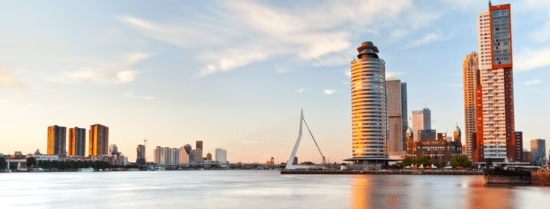How do you get a healthy green city on the one hand and maintain car mobility on the other? Scientist Anna Bornioli (Erasmus School of Economics) talks about common misconceptions on accessibility and mobility in the city during Studio Erasmus. “When we talk about accessibility and liveability, I think we should look at the bigger picture.”
Walking, cycling, or eating alongside a busy urban highway are nowadays normality for us. But the concept of normality changes very quickly according to Anna Bornioli, senior researcher Urban and Transport Economics. “25 years ago, it was quite normal to smoke on an airplane. Nowadays it is not, and we are much more focused on sustainability and liveability. It's a global trend.” Yet many people are still sceptical about the focus on sustainability and liveability. They think, for example, that a sustainable city has a major impact on accessibility and freedom of mobility in the city. But is that really the case?

Are car-free cities bad for local economy?
Very often, retailers and the hospitality industry think that it’s very bad that there is no parking available very close from where they are, because this will damage business. Car-free cities would therefore be bad for the local economy. A misconception, according to Anna. She stresses that we should not forget that Amazon and Bol.com have been big game changers in the way people experience city centres. “Nowadays we go to the city centre for a cup of coffee and to buy a shirt. This shows that it is important to have a pleasant environment, otherwise we would not even go there.”
In addition, research at our university shows that people who went to the city centre on foot, by bike or by public transport spend more on average than people who went by car. “This is probably because they go there more often, or because they spend the day in a nice way. In short, it is not true that car-free cities are bad for the local economy,” she emphasises.

We can change city form
“How many times have we heard that Rotterdam was made for cars? Of course, it is true, no one is denying that but also Barcelona is a city who was built with cars in mind. You can see these very big alleys and its great structure. The municipality of Barcelona has created a model that has become innovative in the field of urban planning, which is called superblocks.” Superblocks are cells in neighbourhoods that are totally protected from traffic. But surrounded by streets where cars can still go undisturbed and this is creating both space for pedestrians, cyclists, and for cars.
“Studies have shown that this prevents about 700 premature deaths every year,” Anna says. “The bottom line is that people are walking more and there is less air pollution from fumes. It makes it clear that with a little creativity we can find ways to make Rotterdam a more pedestrian-friendly city, while maintaining accessibility.”

People (and their behaviours) can change
“It is not true that you cannot change people's behaviour. Think of Covid, for example, and how it changed our habits. Many people started working from home and are still working from home. People's habits change and it is also possible to change people's behaviour.”
Anna is very curious to see what Rotterdam's Hofplein will look like in a few years' time if the municipality's redevelopment plans go ahead. “When it comes to the accessibility and liveability of a city, I think we have to look at the bigger picture. It's only been 25 years since people were smoking on planes. Let's see where we are in 25 years and whether we look at pictures of busy highways where people walk with the same horror in our eyes as when we saw the picture of people smoking on planes.”
- Related content

